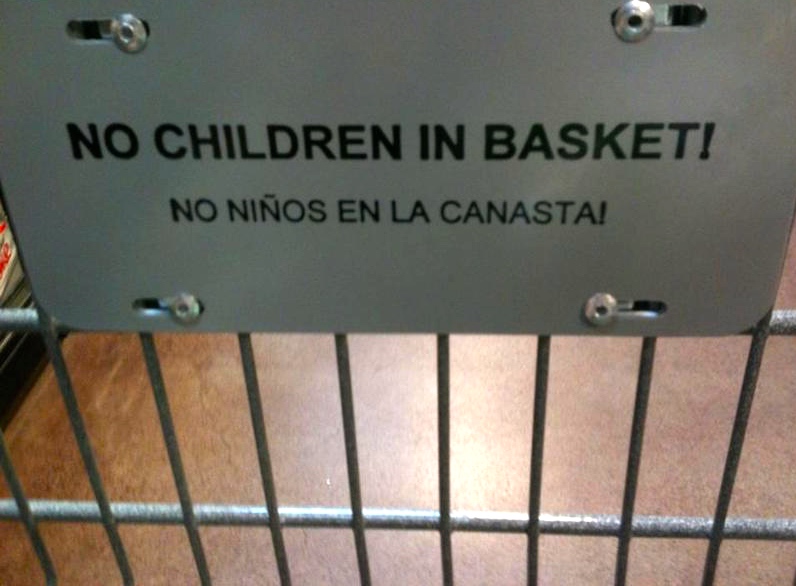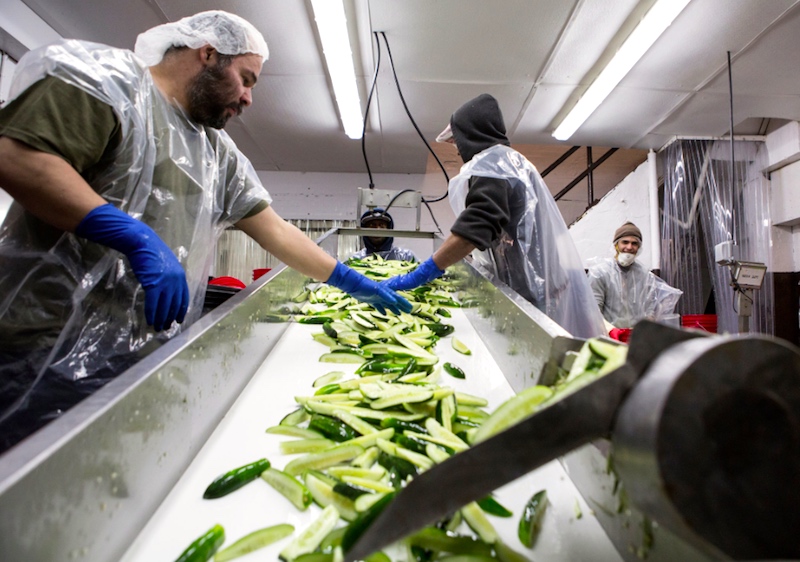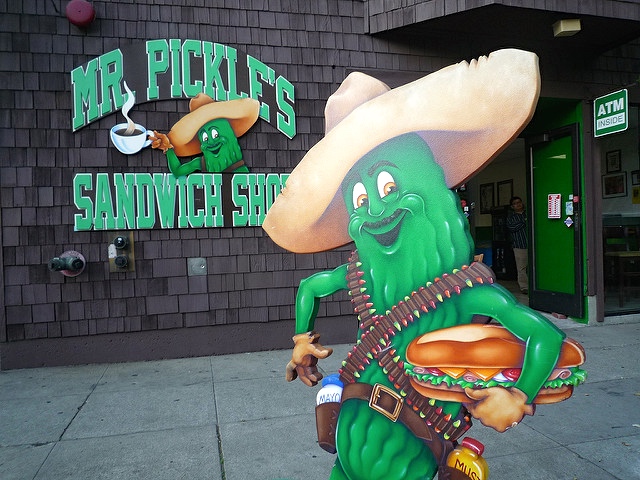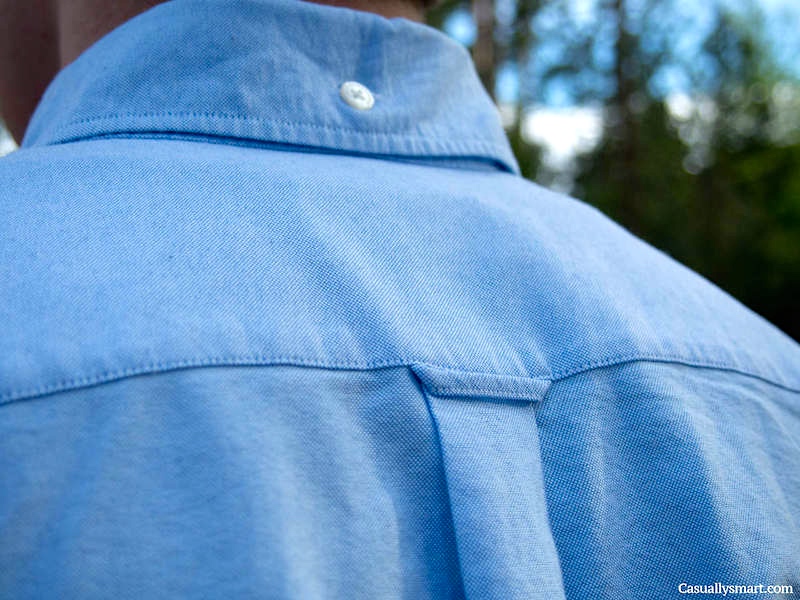Note: this posting is about pickles (in the American sense: pickled cucumbers) and uses of the word pickle, especially in proper names; my main theme is that pickles and the word pickle tend to be intrinsically funny, inherently risible. I’ll be citing a whole bunch of uses, but I do not intend this posting to be a complete inventory of uses of the word, so if I don’t mention some example that you know or especially like, please add it in a comment, but don’t do this by accusing me of having failed or neglected to mention your example; that would just be gratuitously insulting.
It started with an entertaining piece by Winnie Hu in the NYT on the 15th: (on-line) “At United Pickle, Preserving the Standards of a Deli Staple”, (in print) “Family-Run Supplier Preserves Standards For a Briny Deli Staple”, beginning:
Not every cucumber has what it takes to be a pickle. As dozens of them tumbled from a steel hopper onto a conveyor belt in a Bronx factory, two workers enforced a strict pickle standard.
Bruised. Broken. Too curvy. Too short. Sorry, no exceptions.
The rejects — about one in 10 — were tossed into plastic bins, destined to become relish.
“You can’t just pickle any produce,” said Stephen Leibowitz, the self-described “chief pickle maven” of this operation, as he reached past the workers to personally pluck out an offending cucumber. “I can put in the best ingredients, and they still won’t turn out right.”
Mr. Leibowitz is the man to see if the pickles at your local deli, diner or burger joint have lost their crunch. Whether kosher dills, sours, half-sours or bread-and-butters, chances are they got their start on the production line at United Pickle, the largest family-owned supplier of pickles and pickled condiments in New York City.
Or as Mr. Leibowitz, 73, ever the pickle pitchman, put it, “If you’re in a pickle, call United Pickle.”
Kosher dill spears in preparation:
![]() (#1)
(#1)
Later in the piece:
United Pickle is one of the last of what were once scores of pickle companies in New York City that helped elevate a common deli staple into a culinary treat. United Pickle, which traces its roots to the 1890s on the Lower East Side of Manhattan, is owned by Mr. Leibowitz and Marvin Weishaus, 61, the president of the company. Mr. Leibowitz and Mr. Weishaus, third- and fourth-generation pickle men, merged the traditions and the secret recipes of their families in 1979.
Today, United Pickle makes nearly 50 million pounds of pickles and pickled condiments a year for restaurants, stores and companies as far away as Dubai, Japan and South Korea. About three-quarters of that is produced at its Bronx headquarters, a 25,000-square-foot brick building in the Tremont neighborhood. The company, which has 50 full-time employees, also owns a seasonal processing plant in New Jersey and uses packing plants in California and Ohio.
I love the idea of third- and fourth-generation pickle men.
Brief background on pickles and pickling. Many foodstuffs can be pickled, that is, preserved in brine or vinegar, or both: there’s pickled herring, pickled meat, pickled eggs, pickled cauliflower, pickled peppers, pickled beets, and more, and of course pickled cucumbers (hereafter, just pickles). Pickles are especially common in northern and eastern Europe (roughly, the Germanic and Slavic lands). So we have a homey, everyday foodstuff, with (in the U.S. at least) strong Jewish associations (which opens them for Jewish humor), it’s highly phallic to boot, and it has an -ickle name (like fickle, prickle, trickle, stickle), allied to words in –iggle (giggle, wiggle, etc.) and words in -icker (snicker, knicker, etc.), which means that the word sounds rather silly, even if you don’t think about the referent. All of which makes pickles and their name likely objects of fun.
Earlier postings. I’ll take these up in chronological order.
9/4/06 on Language Log, “Barney Miller and the linguist” (link):
I remembered a guy on “Barney Miller” enraged by pickle ad copy along the lines of “crunch-crunch-crunchalicious”. This might or might not have happened, though the wonderfully fey “ko-ko-kosherific” (note portmanteau of kosher and terrific) pretty clearly did. And the language loony was identified as, oh dear, a LINGUIST.
(A reader found a description of the show: “A linguist vandalizes a billboard to protest improper grammar in advertising”.)
2/4/13: “Annals of phallicity: or are you just happy to see me?” (link): the figure, “Is that an X in your pocket, or are you just happy to see me” (reporting on an erection), with X = gun, pistol, banana, but with other phallic-symbol words attested, including pickle
8/24/13: “Men and their pickles” (link): “never get Freudian with a man holding a pickle” (from a Law & Order episode); on the risibility of pickles (as phallic symbols); on a wonderful Firesign Theatre episode playing around with pickles; stroke one’s pickle ‘masturbate’ [similarly, suck s.o.’s pickle]
8/24/13: “pickles” (link): on the food; on cucumbers and cucumber pickles as phallic symbols; pickle kisser ‘gay man’ (i.e., ‘cocksucker’); tickle my pickle and The Tickled Pickle Massage Parlor (in Amsterdam)
4/1/14: “April 1” (link):
On April 1, 1970 NBC reportedly paid tribute to the Swiss Spaghetti Harvest by broadcasting a segment about a farm where pickles grew on trees. One of the only descriptions of this segment is found in The Pleasures of Deception by Norman Moss:
On April 1st, 1970, on the National Broadcasting Company’s Huntley-Brinkley programme, John Chancellor did an item on that year’s pickle crop, with film of a dill pickle tree. He said he was reporting from the Dimbleby Pickle Farm.
(tangentially related: 12/3/14: “just happy to see me” (link): a Mother Goose and Grimm with the “just happy” figure, in the caption: “No, I’m not just happy to see you, I’m a unicorn.”)
New stuff: pickles and the common noun pickle. In no particular order.
Item 1: On the bon appétit magazine site on 8/30/12, food writer Sam Dean on “Origin of the Phrase “In a Pickle””:
These days, the phrase “in a pickle” has an old-timey ring about it–the last time you heard it, it was probably referring to a baseball player trapped between two bases, and even that’s more commonly called a “rundown” by today’s commentators. But you know what it means: to be stuck in a difficult situation.
Dean runs through the OED on pickle ‘difficult situation’: (a) John Heywood 1562 poem, interpretation unclear; (b) Shakespeare, The Tempest, but “the usage seems to be closer to another common meaning of “pickled”: to be drunk, soused, sloshed, blotto, or whichever preferred term you use for alcoholic inebriation”; (c) first solid use of in a pickle in current sense from Pepys’ diary on September 26, 1660. Dean goes on:
Apparently it’s a Yank thing to use “pickle” to mean “a pickled cucumber,” and the Brits use “pickle” to refer to what any American hot dog vendor would call “relish”: a sloppy sauce made of chopped-up, pickled vegetables [as in Branston pickle]. With that context in place, “in a pickle” as Pepys used it suddenly makes sense as a pretty direct metaphor. Like the veggies in the relish, if you’re in a pickle, you’re in a state of jumbled disarray.
Item 2: a 10/4/05 Achewood cartoon with “pickles on parade”:
![]() (#2)
(#2)
The idiom pickles on parade is a coining, possibly by Chris Onstad, or possibly something he picked up from someone else. It looks like a loose combination of in a pickle and rain on s.o.’s parade.
(On rain on s.o.’s parade, from the Oxford Dictionaries site: ‘prevent someone from enjoying an occasion or event; spoil someone’s plans’)
In Urban Dictionary:
pickles on parade
A bad situation to be in. An unfortunate ocurrence.
Ah, I see. Well this IS pickles on parade. For both of us, mind you.
by Mark Blue 9/13/07
(The (unattributed) quotation is from #2.)
Item 3. Literal pickles, literally on parade, in this playful 2/3/13 photographic composition by Peter Dunne “Pickles on Parade”
![]() (#3)
(#3)
We are pickles, and we’re here to say, pickles have to be eaten in a certain way. (My contribution, not Dunne’s.)
Item 4. “Hammer and Pickle: Jewish Humor in the Soviet Union”, the title of one or more 2015 talks by Sasha Senderoff, Asst. Prof. of Russian Studies and Jewish Studies at Univ. of Colorado, Boulder, reporting on his research on Soviet Jewish humor. A play on hammer and sickle. From NOAD2 on the original:
the symbols of the industrial worker and the peasant used as the emblem of the former Soviet Union and of international communism
Visual play on the emblem:
![]() (#4)
(#4)
And a more or less literal interpretation, from the S. Weasel site:
![]() (#5)
(#5)
Item 5. Senderoff’s stuff led me to the Jewish Humor Central site (jewishhumorcentral.com), which is jam-packed with great stuff, including an interactive video of animated kosher dills. Still from the interactive video:
![]() (#6)
(#6)
You can watch the video (with an exuberant deli song) here. You’ll need to click on the pickles one by one to get to the song.
New stuff: pickle used in proper names. Again, in no particular order.
Item 1. The tv show Mr. Pickles. From Wikipedia:
Mr. Pickles is an animated television series created by Will Carsola & Dave Stewart for Adult Swim [a deeply X-rated network available for late-night watching only]. The series revolves around the Goodman family, namely their 6-year-old son named Tommy and the family’s border collie, the demonic Mr. Pickles. The series has been picked up for 10 quarter-hour episodes for its first season, which premiered on the network on September 21, 2014 [and was renewed for a second season]
In the small, old-fashioned world of Old Town that is slowly being taken over by the modern world, the Goodman family and their innocent 6-year-old [disabled] son Tommy obtain a border collie named Mr. Pickles. The two spend their days romping around Old Town on classic adventures — while unbeknownst to Tommy and the family (except for Tommy’s grandfather), Mr. Pickles’ secret evil streak drives him to slip away to kill, mutilate and hump his victims.
… The titular character of the series. He is the Goodman family’s pet border collie who loves to eat pickles (hence his name) which Tommy regularly feeds him. He also enjoys mutilating, killing, and humping as well as engaging in sexual debauchery. He possesses demonic powers, which allows him to control local animals to do his bidding. Despite his evil ways, he actually is quite protective of the impressionable young Tommy: protecting him from danger and will often kill those who might mean to do the boy harm (such as murdering a group of pedophiles or turning an unlicensed breast surgeon who gave Tommy breast implants into a multiple-breasted freak).
(Hat tip to Juan Gomez.The show’s logo:
![]() (#7)
(#7)
And the main cast:
![]() (#8)
(#8)
Note the 666 on the logo. The cast in #8, left to right: Tommy, Mr. Pickles (who’s forever sexually assaulting Tommy’s mother), the mother (voiced by Brooke Shields), Tommy’s grandfather (the only person to understand Mr. Pickles’ satanic nature), and Tommy’s father.
You can watch the pilot episode here. I warn you that it is not only X-rated and tasteless, but it goes well beyond simple tastelessness, into downright nastiness that I find very hard to take.
Item 2. The Mr. Pickles Sandwich Shops, which I’d been unaware of until yesterday (even though a number of them are located not far from where I live). Nothing extraordinary about the sandwiches, though many of them have interesting names. (I hope that the company is unaware of the tv series. A nasty resonance for the company.)
The individual franchises have websites with tons of photos of overstuffed sandwiches on them, none (so far as I can tell) identified. But here’s a photo of the Daly City location:
![]() (#9)
(#9)
From the menu on the company’s website, a descri[tion the its eponymous sandwich, The Mr. Pickle:
The Mr. Pickle (695 cal) sandwich is hot: Chicken Breast, Bacon, Avocado, Melted Monterey Jack
What some would call a California chicken sandwich (thanks to the avocado and the Monterey jack). Some other offerings:
Summer Love, Hang Loose, Tom Turkey, Manhattan (hot pastrami and melted Swiss – ok, pastrami, but certainly not kosher), Hot ‘T’, Chicken Ranch (with ranch dressing, but the echo of the Chicken Ranch brothel in Nevada might not be welcome — but maybe the idea was to sound “naughty”), Fast Eddy, Kickin’ Chicken (for the rhyme), Big Easy (chicken salad, Swiss, avocado – how is this New Orleanian?, not much like a po’boy, in any case) , Got Beef (play on the Got Milk? ad campaign, maybe combined with the Where’s the Beef? ad campaign?), Big Jake (allusion to the John Wayne Western movie)
The location map on the company’s website tells me that there are a huge number of franchises in the Bay Area, mostly in the East Bay, plus two on the Central Coast, and one in SoCal.
Item 3. Going back in time, to the Dick Van Dyke Show on tv. From the Wikipedia page on actor Morey Amsterdam’s character:
Maurice “Buddy” Sorrell (Morey Amsterdam) – an energetic and at times sarcastic “human joke machine”, one of the comedy writers. Amsterdam was recommended for the role by Rose Marie as soon as she had signed on to the series. Buddy is constantly making fun of Mel Cooley, the show’s producer, for being bald and dull. His character is loosely based on Mel Brooks, who also wrote for Your Show of Shows. He makes frequent jokes about his marriage to his wife Fiona Conway “Pickles” Sorrell. In several episodes, it is mentioned that Buddy is Jewish. He was identified by his birth name, Moishe Selig, when he had his belated bar mitzvah in “Buddy Sorrell – Man and Boy.” Buddy plays the cello and owns a large German Shepherd named Larry.
So I remember Buddy’s wife Pickles from way back. Don’t know why she was called Pickles — possibly just because it’s a silly name.
Item 4. A Bay Area institution, the Pickle Family Circus. The beginning of the Wikipedia page:
The Pickle Family Circus was a small circus founded in 1974 in San Francisco, California, USA. The circus formed an important part of the renewal of the American circus. They also influenced the creation of Cirque du Soleil in Montreal. Neither circus features animals or use the three-ring layout like the traditional circus.
After working with the San Francisco Mime Troupe, the Pickle Family Jugglers (founded by Peggy Snider, Larry Pisoni, and Cecil MacKinnon) decided to create the Pickle Family Circus. Their first show was in May 1975, in the gymnasium of John O’Connell School in San Francisco. After they received a grant from the National Endowment for the Arts in 1976, they went on their first tour, going to five cities in Northern California. During the late 1970s and early 1980s, the Circus performed on weekends in the San Francisco Bay area during Spring and Fall, and toured for 3 months in the summer, mostly in towns along Highway 101 in Northern California and Oregon. In these years, the Pickles operated with a business model that every show was a benefit, usually for a local community organization. The local sponsor sold advance tickets (getting a portion of the revenue), did publicity and site preparation, and ran a midway. The Circus returned to the same towns year after year, and these events became an important source of funding for the sponsors.
A poster from days long gone:
![]() (#10)
(#10)
The name was almost surely chosen for its silliness value.
![]()
![]()





























































